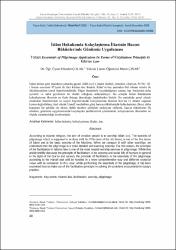İslâm Hukukunda Kolaylaştırma İlkesinin Haccın Rükünlerinde Günümüz Uygulaması
Abstract
İslâm dinine göre insanların yaratılış gayesi Allâh (cc)’a ibadet (kulluk) etmektir. (Zariyat, 51/56) Âli İmran suresinin 97.âyeti ile farz kılınan hac ibadeti, İslâm’ın beş şartından biri olması sebebi ile
Müslümanların temel ibadetlerindendir. Diğer ibadetlerle kıyasladığımız zaman, hac ibadetinin daha
ayrıntılı ve sabır gerektiren bir ibadet olduğunu anlamaktayız. Bu sebeple İslâm hukukunda
kolaylaştırma ilkesinin en fazla ihtiyaç duyulduğu ibadetlerden biridir. Bu makalede genel olarak
insanların ibadetlerinde ve sosyal hayatlarındaki kolaylaştırma ilkesine Kur’an ve sünnet ışığında
kısaca değinilirken, özel olarak Hanefî mezhebine göre haccın rükünlerinde kolaylaştırma ilkesi, daha
kapsamlı bir şekilde ele alınıp, farklı mezhep görüşleri mukayese edilerek, haccın rükünlerini îfa
ederken, günümüz uygulamasında karşılaşılan problemlerin çözümünde, kolaylaştırma ilkesinden ne
ölçüde yararlanıldığı incelenmiştir. According to Islamic religion, the aim of creation people is to worship Allah (cc). The worship of
pilgrimage which is supposed to be done with the 97th verse of the Ali İmran, is one of the five terms
of Islam and is the basic worship of the Muslims. When we compare it with other worships, we
understand that the pilgrimage is a more detailed and exacting worship. For this reason, the principle
of the facilitation in Islamic law is one of the most needed worship services in pilgrimage. While this
article briefly discusses the principle of facilitation in the worship and social life of humans in general
in the light of the Qur'an and sunnah, the principle of facilitation in the essentials of the pilgrimage
according to the Hanafi sect will be handled in a more comprehensive way and different sectarian
views will be compared. In this issue, while performing the essentials of the pilgrimage, it has been
examined how to make use of the facilitation principle in solving the problems encountered in today's
practice.
Source
Sosyal Bilimler DergisiVolume
20Issue
3Collections
- Cilt 20 : Sayı 3 [20]



















